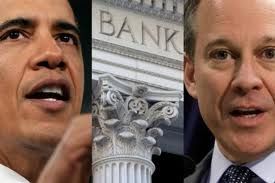First thing- it doesn’t have anything to do with “Health Care” nor is it “Reform”. It’s about Mandated Insurance Coverage, taking money from your pocket and forcing you to give it to ghouls.
Health Care All But Ignored in the State of the Union
By: Jon Walker, Firedog Lake
Wednesday January 25, 2012 7:46 am
If you look at President Obama’s State of the Union address as primarily a political speech to kick off his re-election effort, you get a strong sense of what the Obama campaign thinks are his strengths and weaknesses.
…
(I)n the entire 7,000 word speech, there are only two lines, one of which ignores the proposed large expansion of government Medicaid, sandwiched between other unrelated talking points.I take this as a strong sign that the Obama campaign is basically admitting they simply can’t win the politics on Obamacare. It’s a sign they believe their best political approach is just to ignore the issue as much as possible in the campaign. The law was unpopular when it passed and is still unpopular to this day. There is no reason to believe it will get any more popular by November.
It’s not working-
Number of Uninsured Americans Steadily Increasing
By: Jon Walker, Firedog Lake
Tuesday January 24, 2012 8:58 am
Since President Obama took office the percentage of uninsured people in America has been steadily raising and has now reached a new high.
…
I simply don’t know how the Administration can successfully campaign on passing a law to expand coverage, when the level of uninsured has increased significantly during Obama’s tenure. It is tough for people to see such a law is any form of a real accomplishment when over a year after its passage it hasn’t even begun to accomplish its main promises and the exact opposite is taking place in people’s lives.Instead of campaigning on delivering for the American people with his signature legislation, Obama will be forced to explain that even though the insurance situation has gotten worse, voters need to trust his claims that his signature law will eventually improve things in the future.
“Eventual change in the future I hope you believe me about” just doesn’t have that nice campaign ring to it.
The decision to delay the start date of the primary expansion in the Affordable Care Act until 2014 should be remembered as one of the most idiotic political and policy decisions ever made. I would argue that if Obama narrowly loses in 2012, it could be the single decision that is most responsible.
…
Almost no one will remember the bill’s official CBO score come November 2012, but plenty of people will remember they haven’t seen any tangle benefits from the law Obama spent a year working on in the middle of an economic and unemployment crisis.
It’s deeply, deeply unpopular-
American People Still Really Hate the Individual Mandate
By: Jon Walker, Firedog Lake
Thursday January 26, 2012 8:48 am
Even after almost two years since the passage of the Affordable Care Act, the individual mandate continues to be as unpopular as always. An overwhelming 2/3rds of the county holds an unfavorable view of the mandate and the majority thinks the Supreme Court should strike it down.
…
The individual mandate was clearly politically toxic long before the Democrats voted for the law and it has remained politically toxic ever since. The Democrats had both ample warning and ample time to replace it with a less controversial and unquestionably constitutional alternative to encourage individuals to get insurance. Such a modest correction would have been easy to make right before passage to increase support for the law.I don’t know if I can think of another policy that was ever viewed so unfavorably by the electorate yet was still very publicly pushed forward by one party. The disdain this move showed toward public opinion played an important role in driving the conservative energy that allowed the GOP to win a historic victory in the House. The fact that Democrats could have easily avoided this political problem yet actively choose not to makes it one of the greatest unforced political errors in American politics.
Given how many people actually expect the Supreme Court to strike down the mandate, it is hard to guess whether a favorable ruling for the administration would be a political positive or negative for Obama.
…
They currently don’t think they need a Republican to win the Presidency for the highly unpopular mandate to go away. If the Court doesn’t get rid of it as these people expect, that could give many a new incentive to help elect Republicans in order for the GOP to get rid of the mandate with legislation.
Remember, it’s all about electoral victory!

 I realize that there has been a lot of speculation about what went down in the 24 hrs prior to the SOTU after Miller announced that there was no bank/state settlement deal. There is a lot of speculation about Schneiderman and not without good reason. When I was writing
I realize that there has been a lot of speculation about what went down in the 24 hrs prior to the SOTU after Miller announced that there was no bank/state settlement deal. There is a lot of speculation about Schneiderman and not without good reason. When I was writing  On this day in 1788, Captain Arthur Phillip guides a fleet of 11 British ships carrying convicts to the colony of New South Wales,
On this day in 1788, Captain Arthur Phillip guides a fleet of 11 British ships carrying convicts to the colony of New South Wales,
Recent Comments